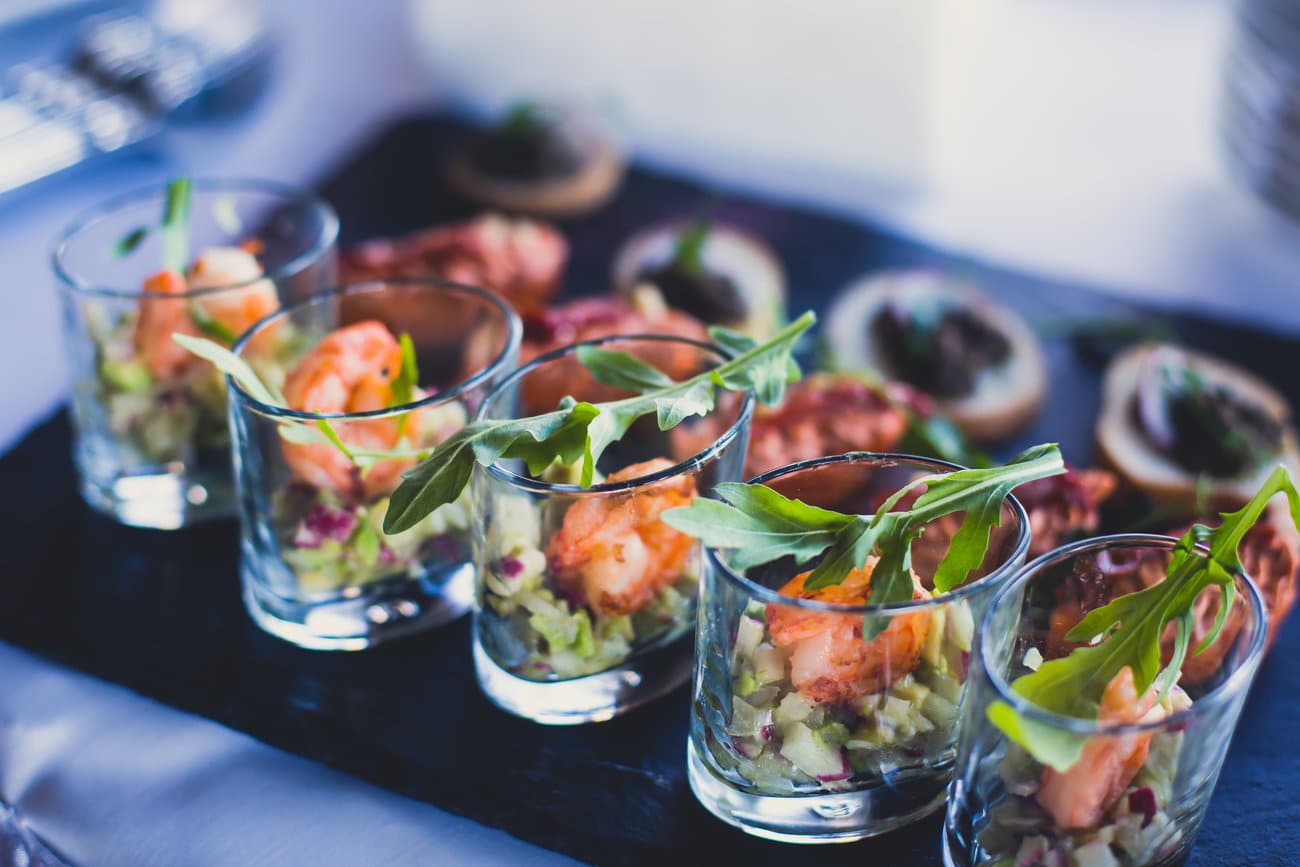Jasmine Birtles
Your money-making expert. Financial journalist, TV and radio personality.


Private home events and small weddings could soon be back on the agenda – and that means you could make money with a private dining business!
Food is a huge part of our celebrations, large and small, and private dining is set to soar as the ‘new normal’ kicks in. Rather than heading out to restaurants, people will host dinner parties in their own homes – and you’re the chef! Plus, many celebrations and events have now been cancelled or postponed – and people will still want to celebrate. Give them the option of hosting their own parties at home – without worrying about the catering.

What IS a private dining business? Usually, it involves a chef (and sometimes more staff) providing a professionally-cooked meal for a small gathering. You’ll offer this service in people’s homes or businesses, to give them a fine dining experience without the need to visit the top restaurants. Sometimes, private dining businesses also expand into wider catering opportunities, like weddings and events, too. This ensures a more regular income, though does need more work (as events can be for several hundred people, rather than a private dinner party of 10!).
Launching straight into a private catering business without any previous experience isn’t the best idea! You’ll need a background culinary knowledge, as well as an understanding of business skills, to make it a success. You wouldn’t set up a childcare business if you’ve never taken care of a child before, right?! Setting up a catering business without some form of culinary background is unlikely to work.
You don’t have to suddenly start doing lunches for 200 people at a corporate event, either! Starting small is a great way to learn what works (and what doesn’t), and build the reputation of your business.
Some business savvy will help you get off to a great start, too. Avoid the most common pitfalls of starting a business – check out this article here for help.
With anything you want to do, a level of experience is needed. You don’t have to be a total expert before you can start a company; if that was true, we would have far fewer businesses around!
It’s a lot about learning as you go. Practice your culinary skills by getting a job in a commercial kitchen. Even a weekend job as waiting staff will teach you a lot about how a hospitality business is run! Remember, too, to test your recipes out on willing volunteers – you need to know your food is something people would be willing to pay for on a commercial level. You’re bound to find lots of friends and family happy to try out your latest creations!
You don’t need a decade-long career in a restaurant kitchen to set up your own private catering business, though. Once you know the basics of cooking, presentation, budget management, client handling, and all the business stuff, you can set up your dream business.
You don’t need a university degree in hospitality before people take your private dining business seriously. The proof really is in the pudding (if you’ll pardon the pun)! Some of the world’s most respected chefs have no real qualifications: hard work and dedication got them to where they are.
That being said, there are a couple of things you will need! If you want to sell food in the UK, you need to apply for food business registration through the Government website. It’s free, but needs to be done at least 28 days before you plan on selling food to the public. Don’t skip that step! You can be imprisoned for up to two years if you’re caught without one, so make sure you register in plenty of time.
You also need a food hygiene certificate. This is required by law for all food handlers. You need this before you start making food for outside consumption, to protect yourself as much as your customers. These last for 3 years and must be renewed for you to continue in your business.
You need to decide if you’re on your own – as a sole trader – or you want to set up a Limited company. Sole traders can still hire freelance staff, and won’t need to arrange to pay National Insurance or employee taxes – so it could be worth starting out as a sole trader and incorporating as a Limited company when you’re more established. This is because running Ltd accounts is a bit more complex, and takes some costs to set up. (Actually, it’s only £12 to set up as a Ltd – but there are other costs, such as hiring an accountant and a solicitor).
You may want to use your own kitchen to prepare food for events, even if you’re providing the catering in someone’s home. It’s often much easier to make ahead as much as possible, to reduce the stress on the day of the event. It also means you can use equipment you know and trust – and not find yourself in a tiny kitchen with no room to cook!
Using your own kitchen means you need to contact your local environmental health officers and ask them to inspect it. They’ll advise you on any upgrades you need to make to your premises in order to comply with food safety laws. They will check that your walls and countertops are in good condition and easy to clean, as well as assess your ability to maintain a hygienic cooking environment. Having it on record that you have had your premises checked is never a bad thing!

The best thing about starting a private dining company from your own home is that there shouldn’t be much in the way of upfront costs. You will already have 80-90% of the equipment required for a fledgling business. As your operation grows, you’ll need to invest in bigger and better equipment to cater for demand.
The first thing you should buy is a couple of sets of chef whites. Wear one at home when you’re preparing for an event, and use the other (clean set!) when you’re at the event itself. You don’t HAVE to wear a uniform in your home kitchen – but it’s a great way to separate your work/home mindset. You’ll feel more professional, and it’s also more hygienic, too.
You will need to invest in some items to start with. Home cooking doesn’t use the same equipment – you’ll need to cook at scale a lot of the time!
Start with a large electric mixer and a blender. You’ll also want pans, mixing bowls, and storage containers of varying sizes. Remember: you’ll make multiple dishes every day and often three or four at the same time. That means investing in plenty of spoons, spatulas, whisks, and fish slices, because you use them so frequently! You will do well to purchase a spoonula too, it is a basic tool, but will revolutionise your kitchen!
Buy good quality cloths, too. Heavy duty, heat resistant and absorbent cloths are going to save you time, and maybe even your fingerprints if something goes awry.
Upgrade your knives. The knives you already have are fine for day-to-day cooking, but you will find that they are not as comfortable when you are using them 7-8 hours a day. Invest in some good quality knives and a steel. That way you will not have to replace your new knives for a long, long time.
Think about your target market: do you want to specialise in catering for parties, or do you want to offer fine dining for small and personal celebrations? You might want to do both private dining AND corporate catering – which broadens your market, but does mean you’ll need to invest in more equipment and marketing costs to start with. Picking a niche is a good place to start: once you’ve exhausted every avenue, branch out!
Think about what you want to provide your clients. Will they get just the food – or will you set up a portable bar as part of the event experience? This can improve your offerings as an optional extra, giving you the chance to earn more money for each event. It’s more work, though, so if you’re operating on your own make sure you bear this in mind.
Pick one clearly defined target market and build your business around one point you have identified you can better (this is known as your Unique Selling Point – such as only using local produce). Build your brand and marketing around this. It will influence the tone of your marketing and how you will interact with customers. Think of it this way: If you were planning a business lunch, would you go with a generic catering company that doesn’t really seem to address your needs, or a caterer that exclusively caters for personalised private dining events and has a website full of testimonials from happy customers? You want to be the latter for whatever niche you choose!
Deciding on your clientele can be difficult, but use your connections. If you know lots of friends or acquaintances with weddings coming up, maybe use that as a way into the wedding business. Or if you know people who work in an office, then try and get booked to cater their next big working lunch.
Don’t forget to use your own past experiences too. If you’ve been to plenty of business lunches before then take what you remember from those and use it to your advantage. If you have never attended a wedding before, its probably a bad idea to move into the wedding catering business! No matter how accomplished you are as a chef, it is a lot harder to succeed if you choose a business model that’s unfamiliar to you.

Your local supermarket might suit you at home – but now’s the time to source wholesale suppliers who can give you top-notch ingredients for your events. Price is a key consideration, especially in tough trading times, but it should not be the only reason for choosing a supplier. Consistent product quality is critical to ensuring the future success of your business.
Other factors such as the level of customer service and how long deliveries take should also be considered to ensure suppliers suit your private dining business. When you find a potential new supplier, ask for testimonials and feedback from existing customers. Good suppliers should be happy to provide these, so don’t be afraid to ask!
When you find a supplier you like, create some service level agreements (SLAs). For example: delivery times and frequency, level of order fulfilment or your policy on product substitution. With these in place, your new supplier will know exactly what is expected.
There is now a greater emphasis on sourcing local suppliers to help minimise food miles and to make the most of fresh seasonal produce. Look for opportunities to use local suppliers where possible and make the most of this by highlighting locally sourced items on your menu. People are always happy to pay more for locally sourced items, but don’t price yourself out of deals while you are still in your infancy as a business.
Now is the perfect time to start talking to others who are either attempting the same thing as you or even those who have succeeded in their venture. Have a look at the MoneyMagpie Messageboards and try to find like-minded entrepreneurs and network! It can’t hurt to get your name and ideas out there at any time.

Interesting idea. Could be the perfect career for the right person.